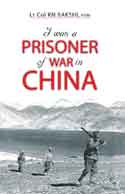I got so worked up with this incident of blind obedience to orders from higher ups, that I took to verbalising my bellicose feelings about the responsibility of the authorities of the day for our sufferings in none too subdued a voice. Outspokenness is one of my glaring failings. And, on this day, I was tactless enough to mention names of a few political VIPs to whom I gave all the credit for the soup we were in. This was done in the hearing of some of the officers of the intelligence team, and in the presence of all other officers present in the ward at that time. I felt I had nothing to hide in the matter, and so, gave vent to my feelings in public.
After this incident on the first day, somehow better sense prevailed in the minds of the hospital authorities. The blanket ban on receiving visitors by the uncleared POWs was now interpreted to exclude members of immediate families. From then on, my wife and children had no problems in visiting me as often as they liked.
At that time, I had failed to consider all the ramifications of my statement. At that time, I did not realise the interpretation that someone in political hierarchy could attribute to my statement.
The confrontation with the intelligence team that I had been eagerly waiting for finally arrived one day. At the very outset, I was asked by the officer debriefing me whether I had been subjected to any brainwashing while I was in Chinese custody. The officer was unable to explain the term ‘brainwashing’. He chose to side-step my question on the subject, and instead, asked me to narrate my experiences from the time of my capture to the time of repatriation at Dirang Dzong. In compliance of these instructions, I gave a full, detailed account of my stay in enemy custody as faithfully as I could recall. In effect, the account that the debrief got to hear from me was more or less the same as has been recorded in this narrative.
As members of the Army, no officer is supposed to have any views on political matters. The subject is taken to such ridiculous lengths; that anything even remotely connected with politics is taboo in all Army messes throughout the country. This insulation of the Army from the political atmosphere of the country had some validity in the bygone days of colonial rulers. But the same attitude being adopted in free India does not augur well for the Republic. However, after I had completely briefed the interrogator about the details of my past experiences, he went into a reflective mood for some time. When he came out of it, I was shocked to hear him mention a subject which is treated like poison in normal enemy circles. He asked me for my opinion about the authority responsible for the muddle we were in. Since my views in the matter were not hidden from any inmate of that room, I unhesitatingly stated them. At that time, I had failed to consider all the ramifications of my statement. At that time, I did not realise the interpretation that someone in political hierarchy could attribute to my statement.
| Editor’s Pick |
Though the debriefing team would clear the interrogated officer within a few days of tackling him, for reasons unknown to me, even to this day, no clearance was given to me for the entire duration of my stay at the military hospital. In effect it meant that I was held as a prisoner for that entire period. The enemy held us in their open prison camps for one month, on the grounds of our daring to raise arms against them. But, here I was being held a prisoner in my own country, in a major army installation that was heavily guarded day and night. The cross would have been easier to bear if only someone had bothered to tell me where I had gone wrong during my enforced stay with the enemy. My physical state and the numerous injuries on my body bore testimony to the fact that I had done all that was humanely possible for me to do, in the strange circumstances that confronted me. I was unable to bear the extended trampling of my human rights for reasons unknown to me. So, on a couple of occasions, when my presence was required in my civilian circle of relations and friends, I defied the rules and regulations of the uncaring and unfeeling all-powerful bureaucracy and left the perimeters of the hospital without any permission. Prior to this, I had never broken any rules and regulations in my entire career as a soldier, but this time I was forced to do so by the unreasonable attitude adopted by the higher-ups.
Prior to this, I had never broken any rules and regulations in my entire career as a soldier, but this time I was forced to do so by the unreasonable attitude adopted by the higher-ups.
My human dignity, which had already been badly bruised during my internment at the hands of the enemy, was being further subjected to inhuman degradation, all this at the hands of our own countrymen of intelligence and feeling, who should have known better about the democratic norms. In harping on ‘brainwashing’, no attempt was made by anyone to define the term at any stage. I am sure that even the intelligence sleuths, who had been detailed to debrief us, were not clear about what they had to look for in doing the job allotted to them. This ambiguity about their duties led them to adopt a set of tactics which hid their ignorance from us and at the same time gave them the satisfaction of having completed the work assigned to them. From the way I was dealt with I realised that they would get their unwary prey to repeat his side of the story uninterruptedly to begin with, and as soon as they got to areas of apparent gaps in the memory of the unfortunate repatriate, they would pounce on him and make him blurt out inconsistencies in his own story, which they would then term as instances of brainwashing. The way in which my interrogator cleverly side-stepped my direct question about the brainwashing phenomenon further lent credence to my belief about the conduct of debriefings.
 A host of other ex-POWs suffered the same fate as me. Of the people that already figure in this narrative, Majors X and Y got their clearance at a very early date. Captain Z was in the category of officers denied clearance for the entire period of their stay in the hospital at New Delhi. Some time after my eventual release from the custody of our countrymen, when I myself found my way into the Intelligence Directorate of Army HQ as a staff officer, I was intrigued to know the meaning of the term ‘brainwashing’ as understood by the top brass in that influential set-up. I could hardly get a straightforward answer to a direct question from anyone in authority in that Directorate. What a travesty of justice as enforced on us in the interests of security of the nation!Planning for operations of any importance is always done by the civilians heading the Defence department, in the central Cabinet, in consultation with the top brass of the Army. In apportioning guilt to the poor soldier on the ground would someone in authority take the trouble to explain how a soldier responsible for looking after a small chunk of the ground can be held responsible for the ignoble way in which the Sino-Indian border war ended in 1962? To blame us for the failure of a plan conceived at the highest level of both the civilian and the military authorities, is just a matter of finding scapegoats to satisfy the hue and cry of indignation raised by the general public at the defeat of the forces that were considered to be invincible.
A host of other ex-POWs suffered the same fate as me. Of the people that already figure in this narrative, Majors X and Y got their clearance at a very early date. Captain Z was in the category of officers denied clearance for the entire period of their stay in the hospital at New Delhi. Some time after my eventual release from the custody of our countrymen, when I myself found my way into the Intelligence Directorate of Army HQ as a staff officer, I was intrigued to know the meaning of the term ‘brainwashing’ as understood by the top brass in that influential set-up. I could hardly get a straightforward answer to a direct question from anyone in authority in that Directorate. What a travesty of justice as enforced on us in the interests of security of the nation!Planning for operations of any importance is always done by the civilians heading the Defence department, in the central Cabinet, in consultation with the top brass of the Army. In apportioning guilt to the poor soldier on the ground would someone in authority take the trouble to explain how a soldier responsible for looking after a small chunk of the ground can be held responsible for the ignoble way in which the Sino-Indian border war ended in 1962? To blame us for the failure of a plan conceived at the highest level of both the civilian and the military authorities, is just a matter of finding scapegoats to satisfy the hue and cry of indignation raised by the general public at the defeat of the forces that were considered to be invincible.
Unfortunately, members of this group of repatriates, who were, incidentally, the most severely injured lot of people, and who had therefore already paid a heavy toll for the failure of the impossible mission entrusted to them, were the only ones who were made to suffer for the inexperience of the Intelligence team, for the unpreparedness of the nation for absorbing the shock of a defeat, and for the military unpreparedness to take on a major power. The numerous wounds on the bodies of all the members of this group bore mute testimony that no one in this group had failed to do whatever lay in their power in defence of the motherland. How then could the senior officers, both civilian and military, whose erroneous decisions had landed us in dire straits, assume a holier-than-thou attitude? Perhaps, they had still to learn that loyalty is a two-way street, which has to be maintained as such under all circumstances to reap the maximum possible gains out of any situation.





It is not the fact that we were mauled by the Chinese in the ’62 war that rankles. Every country has won and lost wars. What rankles and is disdainful, is the attitude of the country, the citizens, the army hierarchy, the bureaucrats and the politicians before, during and after that war. And that attitude exists today also. We live in a country where the armed forces personnel are treated more like mercenaries – till the time the nation as a whole accepts and understands the concept of the ‘unknown soldier’, and gives a special place to all those who have donned the uniform, this sickness in our system will continue.